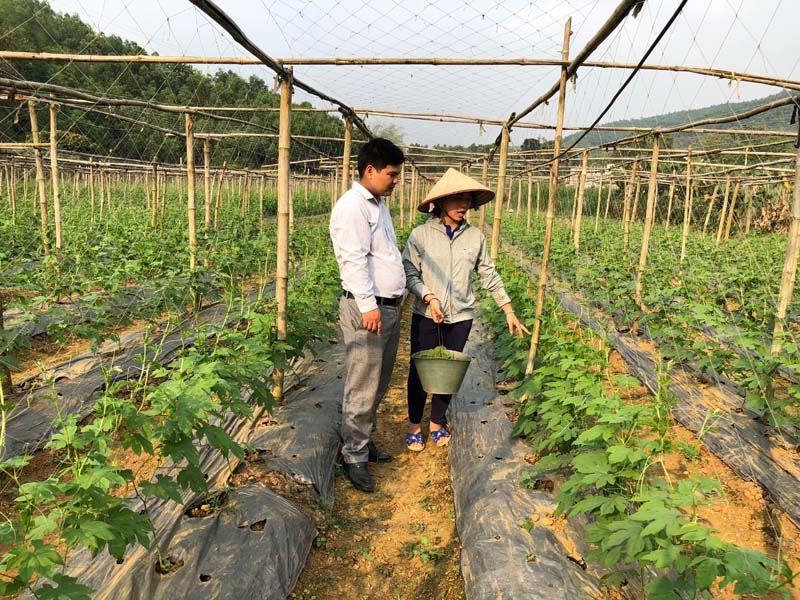
(HBO) - In the Party cell of Doi hamlet, Van Nghia commune (Lac Son), Mr. Bui Van Chun is an example of a pioneered Party member in the economic development. He is a leader in all movements and activities of the hamlet such as the movement of good production and business. Over the past years, he has built a model of integrated farming and breeding farms with scale of 50-60 pigs a litter and planting 5,000 m2 of pumpkin to get seeds, bringing the income of hundreds of million VND a year.

The Party member Bui Van Chuc, the Party
cell of Am hamlet, Van Nghia commune (Lac Son) with a model of growing
high-quality seed plants, contributing to raising the income.
According to Mr. Bui Van Nhi, the Standing
Deputy Secretary of the commune’s Party Committee, with the strict and uniform
leadership and direction of the Party Committee, after half of the term of
implementing the Resolution of the Party Congress at all levels and the
Resolution The commune Party Committee meeting for the XXVII time, the term
2015 – 2020, the targets have achieved important results. Seventeen out of the
seventeen targets have reached and exceeded the plan. The economy has grown,
the social security has ensured, the production and living standards of the
people have been stable, the political security, the social order and safety
have been maintained.
In particular, the officials and the party
members of the Party cells have promoted the core and pioneering role, becoming
the nucleus in the production development, improving the income. In addition to
propagating and mobilizing the people to make efforts to develop the economy,
the party members in the Party cells have also been actively building good
models, replicating good practices and devotedly giving guidance so that the
local people can learn and follow. In the locality, there are many models of
the link and cooperation in the agricultural production, such as the link of
growing plants for high-quality seeds, carrying out land consolidation,
exchanging plots, developing the cattle and poultry herds according to the
direction of farm breeding associated with disease safety, environmental
sanitation and so on. The party members have also taken the lead in improving
mixed gardens, planting valuable fruit trees such as oranges, tangerines,
pomelos, and guava. The area of renovated gardens reached 22.53 hectares, of
which about 10 hectares were renovated by the people themselves.
In the spirit of "Party members go first, the people follow”, all households of Party members in the Doan Ket sub-region in Da Bac town, Da Bac district, voluntarily removed gates and fences, and donated land when the road expansion project passed through their properties. Inspired by their example, 68 households in the sub-region quickly followed suit, contributing over 1,400 sq.m of residential and perennial cropland to widen the main road through the residential area. The exemplary role of Party members in Doan Ket stands as a shining example of studying and following President Ho Chi Minh’s thought, morality, and lifestyle.
The Hoa Binh provincial People's Committee held a monthly meeting on May 29 to assess the implementation of socio-economic development tasks in the first six months of 2025, the progress of key projects, and some other important issues.
During his lifetime, President Ho Chi Minh always expressed his deep affection and special concern for children and youth. He once emphasized: "Caring for and educating children well is the responsibility of the entire Party and the entire people”; "First of all, the family (i.e. grandparents, parents, siblings) must do this job well”. "the Party Committees…, the Children’s Committee, the Youth Union, the education sector, and all related organizations must have specific plans to ensure children grow healthier and more progressive”. His teachings has been remaining valuable and serving as the guiding principles in the work of protecting, caring for, and educating children. In line with this ideology, Hoa Binh Province has continuously been prioritizing and investing resources in the well-being of children in recent years.
Mr. Nguyen Phi Long, the alternate Member of the Party Central Committee and Secretary of the Provincial Party Committee chaired the meeting of the Standing Committee of the Provincial Party Committee to provide opinions on several investment projects within the province. There was the attendance of Ms. Bui Thi Minh, the Permanent Deputy Secretary of the Provincial Party Committee and Chairwoman of the Provincial People’s Council; Mr. Bui Đuc Hinh, the Deputy Secretary of the Provincial Party Committee and Chairman of the Provincial People’s Committee and other members of the Standing Committee; the leaders from other departments, agencies, and some localities.
The Standing Board of the Vietnam Fatherland Front (VFF) Committee of Hoa Binh province held a meeting on May 28 to honour outstanding village elders, village heads, and reputable individuals from local ethnic minority and religious communities.
In mid-May, the provincial Museum organised an exhibition named "Duoi la co Dang Cong san Viet Nam quang vinh” (Under the flag of the glorious Communist Party of Vietnam). This meaningful activity took place in the joyful atmosphere to celebrate the country's major holidays and the Party congresses at all levels for the 2025-2030 term, towards the 14th National Party Congress.



